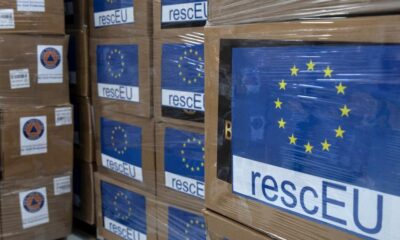Travel
Santorini earthquakes: What does it mean for holidaymakers visiting the popular Greek island?
Residents and visitors have been advised to avoid large indoor gatherings and areas where rock slides could occur.
Schools were closed and emergency crews deployed on the volcanic Greek island of Santorini on Monday after a spike in seismic activity raised concerns about a potentially powerful earthquake.
Precautions were also ordered on several nearby Aegean Sea islands – all popular summer vacation destinations – after more than 200 undersea earthquakes were recorded in the area over the past three days.
“These measures are precautionary, and authorities will remain vigilant,” Civil Protection Minister Vasilis Kikilias said late on Sunday following an emergency government meeting in Athens. “We urge citizens to strictly adhere to safety recommendations to minimise risk.”
Here’s everything you need to know if you are in Santorini or have a trip planned to the island.
Schools closed on Santorini after earthquake swarm
While Greek experts say the quakes, many with magnitudes over 4.5, are not linked to Santorini’s volcano, they acknowledge that the pattern of seismic activity is cause for concern.
The frequency of the quakes, which continued throughout Sunday night and into Monday, has worried residents.
“I have never felt anything like this and with such frequency – an earthquake every 10 or 20 minutes,” said resident Michalis Gerontakis, who is also the director of the Santorini Philharmonic Orchestra.“Everyone is anxious, even if some of us hide it not to cause panic, but everyone is worried.”
Government officials met with scientists throughout the weekend and on Monday to assess the situation, while schools were also ordered shut on the nearby islands of Amorgos, Anafi, and Ios.
Hotels told to drain swimming pools amid earthquake tremors
On Santorini, residents and visitors have been advised to avoid large indoor gatherings and areas where rock slides could occur.
Hotels were instructed to drain swimming pools over concerns that large volumes of water could destabilise buildings in case of a strong quake.
The UK’s Foreign, Commonwealth & Development Office (FCDO) has updated its travel advice for Santorini and the neighbouring island of Amorgos and reiterated the advice from the Greek Ministry of Civil Protection.
“The Greek ministry advises people to avoid the ports of Amoudi, Armeni, Korfos and Old Port (Paleos Limenas) in the area of Fira and to choose safe routes when travelling, particularly in areas where the landslide risk is high,” the travel update reads.
“In case of a strong tremor, people should immediately depart coastal areas. If you are in the affected areas, you should follow the advice of the local authorities.”
Crescent-shaped Santorini is a premier tourism destination with daily arrivals via commercial flights, ferries, and cruise ships.
The island draws more than three million visitors annually to its whitewashed villages, built along dramatic cliffs formed by a massive volcanic eruption more than 3,500 years ago.
‘All scenarios remain open’
Prominent Greek seismologist Gerasimos Papadopoulos cautioned that the current earthquake sequence – displayed on live seismic maps as a growing cluster of dots between the islands of Santorini, Ios, Amorgos, and Anafi – could indicate a larger impending event.
“All scenarios remain open,” Papadopoulos wrote in an online post. “The number of tremors has increased, magnitudes have risen, and epicentres have shifted northeast. While these are tectonic quakes, not volcanic, the risk level has escalated.”
In Santorini’s main town of Fira, local authorities designated gathering points for residents in preparation for a potential evacuation, though Mayor Nikos Zorzos emphasised the preventive nature of the measures.
“We are obliged to make preparations. But being prepared for something does not mean it will happen,” he said during a weekend briefing. “Sometimes, the way the situation is reported, those reports may contain exaggerations […] so people should stay calm.”
Travel
Work from Norway at the ultimate ‘hygge desk’: Here’s how to apply for your free digital nomad trip
Embracing the spirit of uncluttered simplicity, Opera is inviting ten lucky testers to try out a ‘hygge desk’ in Norway.
Is your desk ‘hygge’? For most of us, our workspace is a cluttered nightmare, littered with stale coffee and unfinished paperwork. But what if you could work from somewhere totally hygge, in gorgeous surroundings and ultimate comfort?
That’s the offer on the table from Norwegian browser company Opera as it seeks to promote its web services.
The company is seeking ‘hygge testers’ to try out its hygge desks, positioned in some of the most stunning locations in Norway.
You could find yourselves immersed in a heart-warming six-day stay at a private cabin, with flights and ground transportation included. During your stay, testers will be able to try out the hygge desk and see for yourself just how productive the right environment can be.
“We’re developing a browser that captures the Scandinavian essence of a simple, unassuming life – one that leaves stress behind and helps our users focus on what matters the most,” says Jan Standal, VP at Opera. “We’re used to hygge in Scandinavia, but now we want our worldwide community to understand what that concept means in practice.”
What is ‘hygge’ and how does a desk fit into the concept?
In the Danish and Norwegian languages, ‘hygge’ describes a cosy, contented mood that is brought about through comfort and friendliness. Although the word is common to both languages, its meaning has found a loving home in Danish culture.
In essence, hygge embodies a sense of simplicity, cosiness, and being present. Danes seek to achieve hygge in many aspects of their lives, whether in the food they cook, the clothes they wear, or the way they decorate their homes.
As a Norwegian company, Opera wants to bring hygge to desk jobs – and has created the ‘hygge desk’ to do just that. It’s a cosy workspace adorned with furs and carefully selected facilities that promise to eliminate distractions and enhance the joy of everyday browsing.
“A hygge desk is one that allows you to leave anything annoying or emotionally overwhelming behind,” Opera says. “It accentuates both the pleasure that comes from browsing and the presence of the smallest, cosiest elements at hand – like warm lighting or an epic view of nature.”
As part of the promotion, Opera has released a helpful video with a Norwegian guide demonstrating exactly what is and isn’t ‘hygge’.
The founding principle of the promotion is to demonstrate that the Opera browser, used by only around 2.5 per cent of web surfers, is embracing hygge itself. It promises ‘private and peaceful browsing, free from interruptions,’ that it says is perfectly aligned with the principle of hygge.
For 10 lucky winners, it means a six-day visit to one of five locations in Norway, staying in a private cabin and experiencing the best of the local area.
How to apply to become a hygge tester
Hygge testers can apply for the experience on specific dates.
From 18-23 March, a hygge tester will be invited to Lysefjord, a stunning fjordal location just east of Stavanger. As well as browsing from your hygge desk, visitors will be able to enjoy bathing in waterfalls, hiking, and boating excursions.
From 25-30 March, the hygge desk then opens in Lofoten, where visitors will enjoy picturesque fjords, traditional fishing villages, and a chance to see the Northern Lights. In the same period, the hygge desk at Norefjell will also be welcoming visitors to its peaceful surroundings and ski resorts.
The final opportunity is from 1-6 April, when Bodø and Ålesund’s hygge desks will be open for business. Up in the north, Bodø is known for its stone-age history and moose population, while Ålesund in the west is famed for its art nouveau architecture.
To have a chance to become a hygge tester, hopefuls can apply on the Opera website by sharing why you need a hygge desk. The company favours more creative applications, so you might like to consider sending in a picture of your non-hygge desk or writing a poem about your working life, to be in with a chance.
Applications are open from now until the end of February, with winners announced on or around 5 March. Included in the package are round-trip flights, ground transportation, and your entire six-day stay at one of the Norwegian private cabins.
Striving to embrace hygge has proven to bring many benefits to Scandinavians. While a week at a hygge desk won’t change your life, it sounds like a very good start.
Travel
Finland, Montenegro, Albania: Which digital nomad visa in Europe has the lowest income requirement?
Spain has just increased its income requirements, but its digital nomad visa still isn’t one of the highest in Europe.
Foreigners in Spain who have a digital nomad visa or are thinking of applying for one this year will be subject to higher income requirements in 2025.
The monthly earning threshold is linked to Spain’s minimum wage – and the government has reached an agreement with the country’s main trade unions to increase this by 4.4 per cent this year.
This raise equates to €50 more per month, taking it up to €1,184 per month across 14 payments (€16,576 gross per year).
To understand how this translates for the digital nomad visa financial requirements, it has to be calculated as 12 payments of €1,381.33 per month.
Digital nomad visa applicants need to demonstrate that their monthly earnings are equal to 200 per cent of the minimum wage.
This means you now need to earn at least €2,762 per month to be eligible for the visa in 2025 – up more than €100 a month from last year.
Despite the increase in income requirements, Spain’s digital nomad visa still isn’t one of the highest in Europe.
Here’s how other European countries compare.
Iceland’s digital nomad visa has the highest income requirements
Iceland’s remote work long-term visa is aimed at high-income individuals earning €7,075 per month, the highest in Europe.
Workers can apply either as employees of a foreign company or as freelancers. The visa lasts for six months, and applicants are considered tax residents during this time.
Estonia comes in second, with applicants of the digital nomad visa requiring a gross monthly income of €4,500 a month. The visa lets people working remotely for companies abroad – or freelancers with clients mostly abroad – stay in Estonia for up to one year at a time.
If you remain in the country for more than six months, you will gain tax residency and be subject to local taxes.
Romania’s digital nomad visa, aimed at non-EU citizens, sets its income requirement at €3,950 per month, which is three times the country’s average gross salary.
In 2023, Romanian president Klaus Iohannis signed a new bill to clarify tax requirements for digital nomads. Those staying for long periods are exempt from paying income tax, social security, and social health insurance contributions.
Finland’s digital nomad visa has the lowest income requirements in Europe
Despite having high living costs, Finland requires digital nomad visa applicants to earn a minimum of just €1,220 per month.
Finland’s self-employment visa is open to non-EU entrepreneurs who are self-employed or run an independent business.
Montenegro’s requirements are also low, at around €1,400 per month. Participants can use the scheme to live in the country for up to four years. Digital nomads are eligible for tax breaks, although details are still to be confirmed.
Digital nomads can apply for an Albanian residence permit that allows them to stay and work in the country for up to one year. Introduced at the start of 2022, the so-called ‘Unique Permit’ can be renewed up to five times in a row.
Remote workers must show proof of an employment contract for a company outside of the country that allows them to work remotely, as well as proof of funds to support themselves of an estimated €9,800 a year.
Travel
Dubai is the world’s busiest airport, but is the tourism boom begining to strain the affluent city?
Dubai is welcoming more tourists than ever, but local residents don’t always benefit.
Dubai International Airport was the world’s busiest for international travel in 2024, officials announced on Thursday.
The hub saw a record 92.3 million passengers pass through its terminals last year.
The result cements Dubai’s bounce back from the coronavirus pandemic, surpassing the previous record set in 2018 for the first time.
It coincides with a real-estate boom and the city’s highest-ever tourism numbers, which have made Dubai a trending destination as well as a popular layover stop.
However, the city is now grappling with increasing traffic and housing costs, pressuring both its Emirati citizens and the foreign residents who power its economy.
Dubai Aiport was the world’s busiest in 2024
Today, Dubai International Airport feels like it is bursting at the seams with aircraft movements and crowds passing through its cavernous terminals.
Dubai’s ruler, Sheikh Mohammed bin Rashid Al Maktoum, announced the record number of passengers on the social media platform X.
The state-owned airport is home to the long-haul carrier Emirates, which powers the network of state-owned and state-linked businesses known as ‘Dubai Inc’.
“Dubai is the airport of the world […] and a new world in the aviation sector,” Sheikh Mohammed wrote.
In 2023, the airport, known as DXB, had 86.9 million passengers. Its 2019 traffic was 86.3 million passengers. It had 89.1 million passengers in 2018 – its previous busiest-ever year before the pandemic – while 66 million passengers passed through in 2022.
Dubai plans move to city’s second airport
In 10 years, authorities plan to move operations to the city-state’s second airport after a nearly $35 billion (€33.5 billion) upgrade.
Al Maktoum International Airport is roughly 45 kilometres away from DXB.
The airport, which opened in 2010 with one terminal and is known as DWC, served as a parking lot for Emirates’ double-decker Airbus A380s and other aircraft during the pandemic.
But since then, it has slowly returned to life with cargo and private flights. It also hosts the biennial Dubai Air Show and has a vast, empty desert in which to expand.
DXB and DWC serve 106 airlines flying to 272 cities in 107 countries across the world.
Dubai grapples with tourism boom
While tourism adverts continue to entice travellers to the city, the constant increase in arrivals is putting a strain on the local population and infrastructure.
Traffic on Dubai’s roads is becoming a nightmare for commuters. The price of housing continues to spike, even with new real estate projects being announced almost daily.
“Dubai is on steroids but affordability risks are increasing,” Hasnain Malik warned in a report for the global data firm Tellimer, where he’s a managing director.
-

 Sports6 days ago
Sports6 days agoLight-laser and firecracker throwing: maxi penalty for Napoli
-

 Sports4 days ago
Sports4 days agoEuropa League 2024-2025, Roma-Eintracht Frankfurt, the likely lineups
-
Travel6 days ago
Book your summer holiday now to beat rising package holiday prices, expert warns
-
Travel6 days ago
Bare feet, obscene t-shirts and body art: Watch out for these dress code violations on flights
-

 EU & the World5 days ago
EU & the World5 days agoWhy Did Rachael Kirkconnell & Matt James Break Up?
-

 Sports3 days ago
Sports3 days agoSerie A 2024-2025: Parma-Lecce, the likely lineups
-
Travel5 days ago
London to New York in 3.5 hours: How Boom Supersonic is learning from Concorde’s mistakes
-

 Politics4 days ago
Politics4 days agoEU sends emergency energy assistance to Ireland following storm Éowyn








